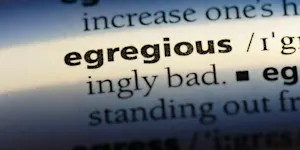What Makes This Word Tick
"Vagarious" is one of those delightful words that sounds as whimsical as its meaning suggests. Originating from the root "vagary," it describes something characterized by erratic or unpredictable behavior. It’s a bit like trying to predict the weather in the spring—full of surprises!
If Vagarious Were a Person…
If "vagarious" were a person, they’d be the life of every party. You’d never quite know what they’d say next or what outlandish adventure they might propose. A vagarious individual might take a spontaneous road trip to a new city just because the mood struck them.
How This Word Has Changed Over Time
The essence of "vagarious" has remained fairly steady, grounded in unpredictability and whimsy. Over time, while its core meaning has stayed intact, the word itself pops up most often in literary rather than everyday contexts, lending an air of sophistication and mystery.
Old Sayings and Proverbs That Use Vagarious
Though there aren't specific ancient proverbs using "vagarious," the concept of a "madcap" adventure or someone being a "loose cannon" carries similar connotations. These idioms embrace unpredictability as part of the human experience.
Surprising Facts About Vagarious
"Vagarious" is somewhat of a rare gem in modern conversation. It's stayed under the radar perhaps due to its multi-syllabic nature, but those in the know relish using it to add flair to their speech or writing. It's a word for connoisseurs of language.
Out and About With This Word
When you go rogue on plans—like deciding to paint your house a bold color on a whim—you're having a vagarious day. It’s ideal for describing those wonderfully unplanned occurrences that bring a bit of spice into daily life.
Pop Culture Moments Where Vagarious Was Used
You'll more likely encounter this word in descriptive writing or character analysis in pop culture reviews rather than spoken dialogue. An eccentric, unpredictable character in a TV show might be aptly described as "vagarious" by a critic.
The Word in Literature
"Vagarious" lends itself beautifully to literary works, especially in describing adventurous tales or erratic characters. It might appear in novels that explore the complexities of human nature, akin to the playful narratives of P.G. Wodehouse or as a descriptor in whimsical poetry.
Moments in History with Vagarious
Picture a medieval explorer setting sail without a clear destination or Columbus's voyage that discovered the Americas—plans that started as vagarious ideas. History has certainly been shaped by those who dared to embrace the unpredictable.
This Word Around the World
While the word "vagarious" itself might not have direct translations, every language has its way of depicting unpredictability. In Spain, you might say someone is acting "caprichoso," capturing a similar sense of whimsy and erratic energy.
Where Does It Come From?
"Vagarious" is derived from the Latin root "vagari," meaning to wander. It paints a picture of a wandering path, much like a river meandering through unknown terrain, metaphorically representing life's unexpected turns.
How People Misuse This Word
Some might confuse "vagarious" with "vicarious," but while both involve an element of human experience, "vicarious" relates to experiencing something secondhand, while "vagarious" is all about the unpredictable primary experience.
Words It’s Often Confused With
Vicarious: Experiencing through another's actions, not unpredictability.
Vague: Lacks clear definition, but not specifically unpredictable.
Erratic: Also describes unpredictability, but with a stronger connotation of inconvenience.
Additional Synonyms and Antonyms
Synonyms for "vagarious" include capricious, whimsical, and impulsive. Antonyms might be predictable, consistent, or steadfast—terms that speak to a reliable nature.
Want to Try It Out in a Sentence?
"As we set out on our vagarious road trip, none of us knew where we’d end up, but the thrill of the unknown beckoned with each mile."
















